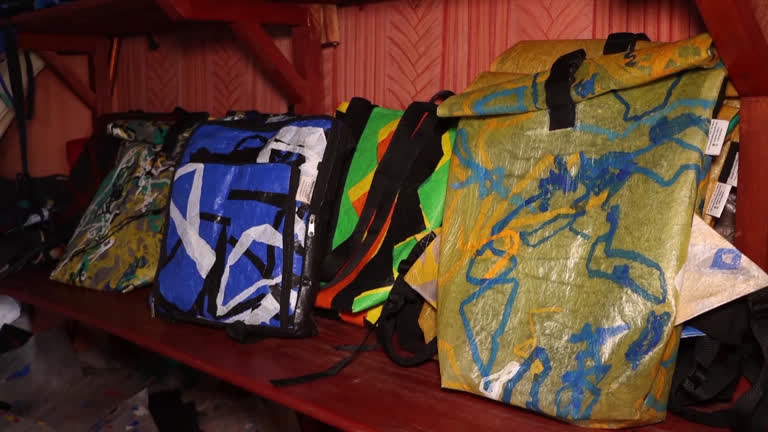Kampala, Uganda’s capital, churns out 1000 tonnes of garbage per day, according to the east African country’s National Environment Management Authority (NEMA).
Most of it ends up as littering the city, clogging vital sewage and drainage systems, causing flooding, and creating unfavorable sanitation conditions.
But what many see as trash was viewed as a solution-based business opportunity by entrepreneur Faith Aweko.
Aweko and her employees turn plastic waste from sites like the well-known Kateezi landfill site – into fashionable handbags.
As a young girl Aweko often came up against the harmful effects of the plastic that littered the low-income area she lived in.
It’s an environmental problem experienced around the world. Used plastic shopping bags are some of the main culprits that pollute oceans and create untold environmental damage to a variety of ecosystems.
“I grew up from one of the slum areas here in Uganda that is Naguru Go-Down, and every time it rained my family and our neighbourhood would think of disposing off our plastic [in the trenches]. This is because of the poor waste management in different areas of Kampala. When it rained we would think of throwing the waste we had in the trenches and this caused flooding. Most times in the night we would spend the whole night either draining water out of our houses or in the morning it was hard to go to school because walking in the floods, having a wet uniform and wet books wasn’t really a good experience. So, I had to miss school many times,” she said.
Aweko and her ‘Reform Africa’ team regularly collect, wash, and hang out discarded plastic bags from Kampala’s dumpsites.
She says the jobs and positive effect on the environment she is creating, more than make up for all the hard work, and criticism she sometimes encounters.
“I like to call myself a ‘waste-preneur’ because I deal in waste and this is something that most people did not want to associate with. Waste, plastics, dumpsites, garbage and yet, this is something that is providing employment to women that are collecting the waste, women who are sorting, to women who are washing and to also women who are processing and making beautiful bags that Reform Africa is making. And then we are also able to provide an income for ourselves and the other employees and I am also championing in saving the environment,” she added.
Once the bags are clean and dry, Aweko uses what she calls a heat presser to flatten and fuse them together.
The pieces are then cut into patterns and stitched together to create colorful bags and accessories.
Aweko currently employs 8 women whom she hired and trained from the surrounding community.
Part of her vision for the Reform Africa Project is to encourage more Ugandans to recycle and help people learn new income-generating skills.
“I am very happy with this job because it has transformed my life very much. It has created a living for me, my child. I am now also able to assist my spouse when he is struggling. This job has really helped me. The other thing is I like that we empty communities of these polythene bags which saves the environment,” said Christine Nakintu, one of Aweko’s employees.
Aweko is a graduate of the Social Innovation Academy (SINA) outside of Kampala, which helps young aspiring social entrepreneurs take their ideas to market.
Business consultant and mentor at the academy – Stella Nakawuki – says focusing on building sustainable businesses that solve problems is their key to success.
“And, we realised that, we are saying every day, there are very many problems in this country, Uganda, everyone is broke, Uganda, the education is not relevant and yet we ourselves weren’t creating solutions to tackle those everyday problems we are talking about. So, an academy like this gives young people opportunity and platforms to actually be the change they want to see by creating solutions tailored to solving everyday problems,” she said.
Aweko’s bags sell for between $16 and $25. She has deals with several local shops and markets heavily using social media platforms to land more clients in the West.
“We have shops, both here and also Europe. In Uganda here we have six shops, four in Kampala and two upcountry that retail our products on commission basis and also do wholesale to international markets. We have over eight shops that wholesale our products, that’s in America and also in Europe,” she added.
Aweko not only hopes to make a mark with her brand, but that her bags will also help spark conversations about environmental awareness, recycling, and waste management.






